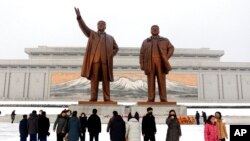Experts say China and Russia are unlikely to support any new international sanctions on North Korea, even if Pyongyang tests a long-range ballistic missile or nuclear weapon to further escalate tensions with the United States.
And given Washington's souring relations with Beijing and Moscow, the U.N. Security Council is unlikely to pass any new sanctions on Pyongyang, experts also say.
Harry Kazianis, senior director of Korean Studies at the Center for the National Interest, said, "I see no chance of Russia and China supporting any sort of U.N. Security Council actions on North Korea at this point, even if the DPRK tests an ICBM (intercontinental ballistic missile) or even a nuclear weapon." "DPRK" stands for North Korea's official name, the Democratic People's Republic of Korea.
"What incentive does Beijing or Moscow have at this point when both nations are at such odds with Washington over so many different issues?" Kazianis continued, pointing to the continuing global-scale U.S. rivalry with China and Washington's standoff with Moscow over Ukraine.
Ending test moratorium
On Jan. 19, North Korea raised the possibility of testing an ICBM or nuclear weapon as it announced it was considering resuming testing the weapons the U.S. considers a direct threat.
North Korean leader Kim Jong Un placed a self-imposed moratorium on testing ICBMs and nuclear weapons in 2018, saying the regime would "discontinue nuclear tests and intercontinental ballistic rocket test fire."
According to experts, the possibility of Pyongyang testing an ICBM became more likely on Jan. 30, when North Korea test-fired an intermediate-range ballistic missile capable of reaching the U.S. territory of Guam, capping off a month marked by seven missile launches.
On Friday, U.S. Ambassador to the United Nations Linda Thomas-Greenfield delivered a joint statement by U.N. representatives of Albania, Brazil, France, Ireland, Japan, Norway, the United Kingdom and the United Arab Emirates after a Security Council meeting convened to discuss the intermediate-range missile launch.
"We urge all member states, particularly our fellow council members, to play a constructive role in implementation of Security Council resolutions addressing the DPRK," Thomas-Greenfield said as she condemned the Jan. 30 missile test.
Kazianis said, "I can almost guarantee North Korea will test an ICBM after the (Beijing) Olympics are over, as North Korea has multiple leadership anniversaries it will want to mark with major achievements" on missiles.
On Jan. 20, China and Russia blocked a U.S. move to impose fresh sanctions on North Korea after the regime's fourth missile test of the month, on Jan. 17. All five permanent members of the council — China, France, Russia, the United Kingdom and the United States — must unanimously pass a resolution for it to go in effect, and each of the five has veto power to block a resolution.
The U.S. State Department told the VOA Korean Service on Friday that the U.S. goal "remains the complete denuclearization of the Korean Peninsula," and that it will not "get into hypotheticals."
Prospects for new sanctions
Gary Samore, former White House coordinator for weapons of mass destruction nonproliferation and counterterrorism during the Obama administration, said if North Korea "conducts a long-range missile test or a nuclear test, they (Beijing and Moscow) will be under heavy pressure to support additional sanctions in the U.N."
Samore continued: "But given the state of relations between the U.S. and China and between Russia and the United States, I'm not sure whether Beijing or Moscow will continue to cooperate with the U.S. to constrain — to limit — North Korea's activities."
Ken Gause, director for the Adversary Analytics Program at CNA, looked at how U.S.-Chinese relations might weigh affect the imposition of sanctions: "The relationship between the U.S. and China is not that good right now, so why would (Beijing) support sanctions to support something led by the United States?"
"North Korea is operating off the assumption that there's great power competition and China and Russia are not going to side with the United States" Gause said.
Evans Revere, a former State Department official with extensive experience negotiating with North Korea, considered how the ongoing crisis in Ukraine is taking the Biden administration's attention away from DPRK. "The possibility of a Russian invasion is occupying a considerable amount of bandwidth in Washington, thus preventing the U.S. from focusing as much on North Korea as it might otherwise wish."
"No one knows this better than Kim Jong Un, who is probably acting the way he is because he seeks to take advantage of Washington's preoccupation with other pressing issues."
Limited options
"Regardless of whether Moscow and Beijing support U.N. sanctions, the Biden administration has the tool to implement both U.S. and U.N. sanctions," said Anthony Ruggiero, senior fellow at the Foundation for Defense of Democracies.
"They must use them to sanction additional entities, individuals and banks that are aiding North Korea's sanctions evasion, including in China and Russia," he said.
In 2017, the Security Council passed multiple resolutions, which China and Russia approved as permanent members, after North Korea had conducted a nuclear test and three ICBM tests, including the Hwasong-15, which reports have said appears capable of reaching the U.S. mainland.
Journalist Jiha Ham contributed to this report, which originated in the VOA Korean Service.




